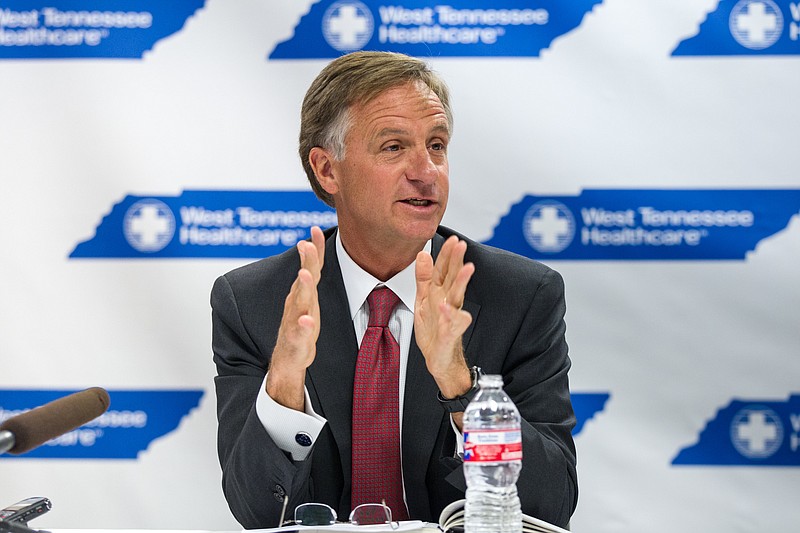Read more
Gov. Bill Haslam is richest politician in America
JACKSON, Tenn. -- Republican Gov. Bill Haslam sought to reassure anxious GOP lawmakers Wednesday that he legally will be able to jettison his plan to use federal Medicaid dollars to insure 200,000 low-income Tennesseans should it prove unworkable.
The governor's comments came as he kicked off a statewide tour at Jackson-Madison County General Hospital in West Tennessee.
It's a high-stakes effort to build support in a Feb. 2 special session of the GOP-dominated Legislature for his "market driven" Insure Tennessee program.
"This is a two-year pilot program," Haslam told the lawmakers. "At the end of that time, we can decide if we want to renew. And at any time -- and I've had this assurance from the folks at [U.S. Health and Human Services] -- ... we decide this is not good for Tennessee we can end the program."
Later Wednesday, the governor met with a similar group of lawmakers in Memphis.
So far, a number of Haslam's fellow Republicans are balking because the pot of money that would entirely fund the program through 2016 comes under President Barack Obama's health care law.
Some are adamantly opposed. And this week that began playing out between two groups, pro and con, in radio ads and direct mail as they seek to reach lawmakers through their constituents.
The response from Republicans attending Wednesday's meeting in Jackson was largely positive.
Sen. Ed Jackson, R-Jackson, one of those on the fence, later told reporters "my questions were answered" in terms of the state being able to "opt out" should the two-year pilot project sought by Haslam not work or become too expensive.
"That was a big problem with TennCare," Jackson said, referring to then-Democratic Gov. Phil Bredesen's move to slash the rolls the in state's existing expanded Medicaid program back in 2005.
During the meeting, TennCare Director Darin Gordon, who helped oversee the disenrollment of some 170,000 TennCare enrollees in 2005 and 2006, said "our state has shown we will make tough decisions when we have to."
Tennessee has a process "approved by the courts" when it comes to disenrollment, he said.
Jackson later said, "I feel a lot better about it." But he stopped short of saying he will vote for the resolution allowing Haslam to proceed, saying, "there's still a lot of gray areas I'd like to have answered. But it looks promising."
Jackson-Madison hospital officials said people will benefit with good medical care even if they're on the program for just two years.
Rep. Jimmy Eldridge, R-Jackson, later said that while he and his wife have good health coverage, many of his constituents don't.
Eldridge said he backs Haslam's effort. He noted West Tennessee Healthcare, which operates Jackson-Madison County General Hospital, has some 5,400 employees. Some of those jobs may be at stake if Tennessee doesn't proceed, he said.
Asked if his fellow Republicans will join him, Eldridge said the issue is what is "best for the state."
"First of all, that doesn't concern me personally. I don't worry about re-election. I worry about doing the right thing," Eldridge said.
Rep. Steve McDaniel, R-Lexington, who said last week he is looking favorably on the program, expressed concerns about three rural hospitals in his district if nothing is done.
Haslam later told reporters "this is not Obamacare. This is a different program that puts incentives in there for healthy behavior both on the user side and on the medical-care provider side."
He said covering more people "in some ways is the easy piece. Controlling the costs is hard because it's one-sixth of the national economy."
But he said he thinks his plan addresses costs: hospitals have agreed to changes in how they are reimbursed.
Instead of getting paid piecemeal by specific items on procedures, it would be pegged to the overall problem.
Tennessee missed out on the Medicaid expansion envisioned under the law that began a year ago. Haslam has since spent time trying to fashion a program conservative enough to please fellow Republicans while still able to win approval from the Obama administration.
He says he has an oral agreement on his two-pronged proposal from Obama administration officials. Now he's seeking authority from lawmakers to negotiate a formal waiver of federal Medicaid rules to proceed.
But he has problems in the Legislature. Last week, Senate Majority Leader Mark Norris, R-Collierville, balked at sponsoring the resolution.
And Republican Senate Speaker Ron Ramsey says the House should go first, prompting House Majority Leader Gerald McCormick, R-Chattanooga, to denounce that as "silly" and "preposterous."
Each chamber needs to proceed simultaneously with its own separate resolutions, McCormick said.
During Wednesday's meeting in West Tennessee, Madison County Mayor Jimmy Harris told Haslam and the lawmakers that "philosophically, as far as Obamacare, I don't like it any better than any of you all do. The federal government in essence intrudes in our lives.
"But," Harris added, "I think we've got to deal with the facts of life and the law that's on the books, and determine what benefits our state and our community."
Haslam said his proposal won't result in higher taxes for Tennesseans. If approved, Insure Tennessee's entire costs would be covered by the federal government through 2016.
By 2020, Tennessee's share rises to 10 percent. But Tennessee hospitals, who say they face cuts due to other parts of the federal health care law that decrease their Medicare reimbursements, have promised to pay for the state's share.
The industry warns that some rural hospitals will close, putting pressure on rural Republicans who could face problems if they wind up getting blamed.
One part of Haslam's proposal, the Volunteer Plan, would provide vouchers to low-income workers who could use them to get on their employers' plan.
The other, Healthy Incentives, is a retooled version of TennCare but with more power to encourage those covered to engage in healthier behaviors like avoiding emergency rooms for non-emergency needs.
Contact staff writer Andy Sher at asher@timesfreepress.com or 615-255-0550.
